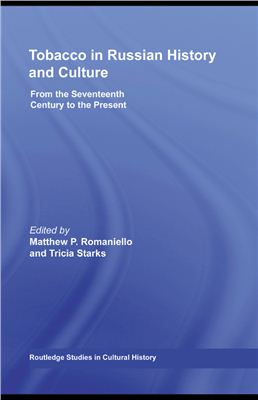Publisher: Routledge, 2009. 296 pages. Language: English.
Tobacco in Russian History and Culture explores tobacco’s role in Russian culture through a multidisciplinary approach starting with the growth of tobacco consumption from its first introduction in the seventeenth century until its pandemic status in the current post-Soviet health crisis. The essays as a group emphasize the ways in which, from earliest contact, tobacco’s status as a "foreign" commodity forced Russians to confront their national, political, and economic interests in its acceptance or rejection and find there markers of gender, class, or political identity. Inteational contributors from the fields of history, literature, sociology, and economics fully present the dramatic impact of the weed called the "blossom from the womb of the daughter of Jezebel".
"[T]he collection of papers put together by Matthew Romaniello and Tricia Starks constitutes a highly useful contribution to our knowledge. Standard Russian/ Soviet history books do not treat the subject of tobacco in any meaningful way. In addition to the generally high caliber of the scholarship, the editors have done an excellent job in recruiting papers that almost seamlessly cover the beginnings of tobacco use through the present day with all relevant periods covered." (Slavic Review)
Tobacco in Russian History and Culture explores tobacco’s role in Russian culture through a multidisciplinary approach starting with the growth of tobacco consumption from its first introduction in the seventeenth century until its pandemic status in the current post-Soviet health crisis. The essays as a group emphasize the ways in which, from earliest contact, tobacco’s status as a "foreign" commodity forced Russians to confront their national, political, and economic interests in its acceptance or rejection and find there markers of gender, class, or political identity. Inteational contributors from the fields of history, literature, sociology, and economics fully present the dramatic impact of the weed called the "blossom from the womb of the daughter of Jezebel".
"[T]he collection of papers put together by Matthew Romaniello and Tricia Starks constitutes a highly useful contribution to our knowledge. Standard Russian/ Soviet history books do not treat the subject of tobacco in any meaningful way. In addition to the generally high caliber of the scholarship, the editors have done an excellent job in recruiting papers that almost seamlessly cover the beginnings of tobacco use through the present day with all relevant periods covered." (Slavic Review)

